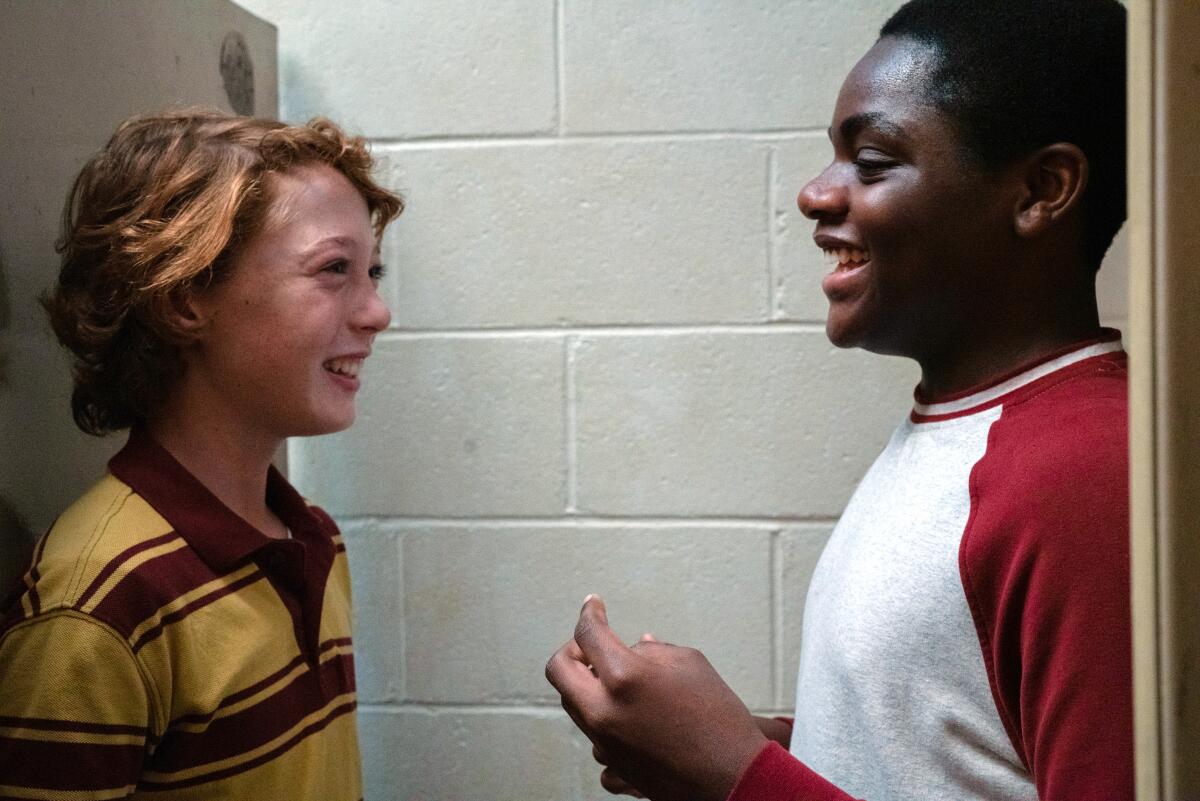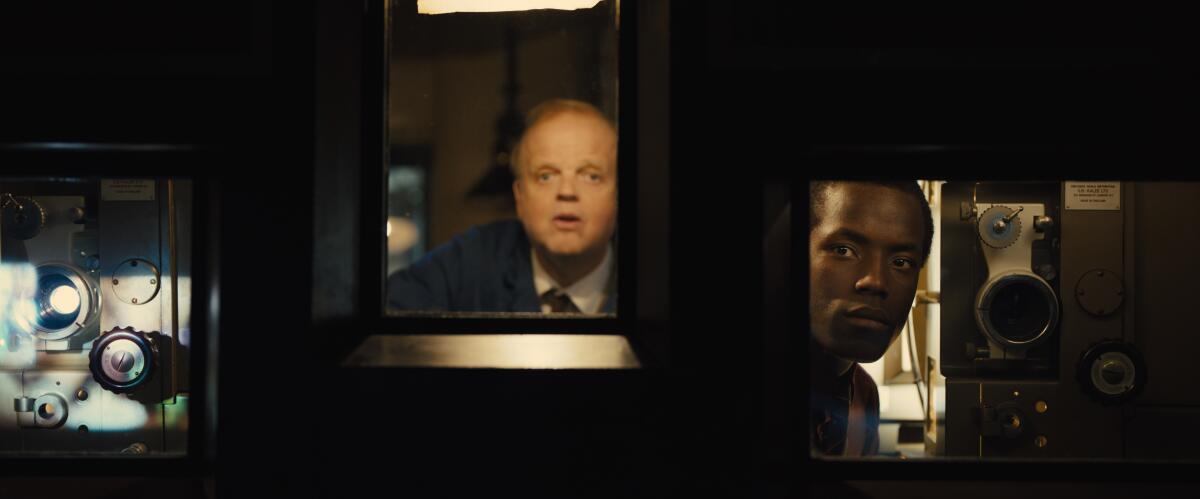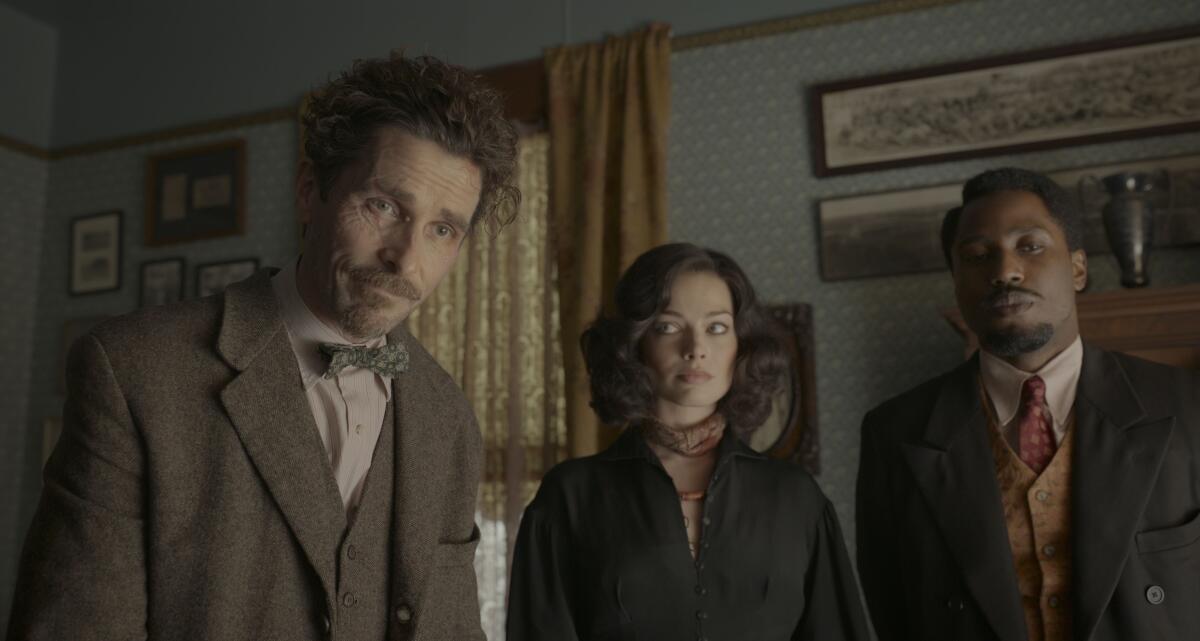Three films that hold a mirror up to our own troubling times

- Share via
A number of established filmmakers this last year unveiled their most personal works to date. All exquisitely crafted, all studded with Oscar-decorated casts, all inspired by real people and events, they stand as testaments to the healing power of art and the virtues of kindness. They also hold a mirror up to our own troubling times.
On the surface, Sam Mendes’ “Empire of Light” is about the magic of movies; James Gray’s “Armageddon Time” is a portrait of the artist as a young boy; and David O. Russell’s “Amsterdam” is a flapper-era murder mystery. But what ties the three together is the theme of racial intolerance, and the idea that those who ignore history are bound to repeat it.
In “Empire,” named after the old-time movie palace in Bristol, England, that plays a key role in Mendes’ movie, a plaque in the lobby declares, “Find Where Light in Darkness Lies,” a reference to the gaps between celluloid frames. But it could also apply to the glimmer of hope that flickers within the dark chapters of our past.
Coincidentally, Mendes’ and Gray’s films are set roughly in the same year, 1980, during Margaret Thatcher’s reign in the U.K. and the dawn of the Reagan era in the U.S., respectively. And for both filmmakers, a seed was planted, the results of which we’re still grappling with.

“My memory of Reagan was a kind of unspoken idea that if you’re poor, it’s your fault,” Gray says. “That you’re a loser. He used to make comments about welfare-check-receiving moms driving Cadillacs,” which Gray felt revealed a not-so-vague racism. “And I felt that this was a message to white Christian America that there’s this big other that’s stealing from you.”
Mendes points to the values of Reagan’s conservative counterpart in Britain as generating a ripple effect that lasts to this day. “Racist politicians of the era, particularly Enoch Powell,” he says, “were allowed to spout opinions unchallenged at the time. Do I see parallels to today? That’s for other people to say. But if you pitch forward 40 years, I suppose you would be somewhat disappointed that we haven’t evolved more.”
In Gray’s film, his 12-year-old alter ego, Paul Graff, is an aspiring artist from a working-class family in Queens. Paul, who is Jewish, is told of the persecution that his ancestors suffered. “Remember your past,” his grandpa (played by Anthony Hopkins) instructs him. But Paul seems insulated from the antisemitism his elders face. His best friend, Johnny, a Black boy from the wrong side of the tracks, is not so lucky.
“Everything is from something that I witnessed or is in my own experience,” Gray says about his movie and the characters in it. “Not a single thing is made up. The teacher calling [Johnny] an ‘animal,’ the increased marginalization of him in the classroom, the school’s open disregard for his welfare. All of that stuff was abundantly clear to me even at a pretty young age.”
In “Empire,” the low-simmering racism depicted in the film comes to a boil when rioters, largely skinheads, crash through the Empire’s glass doors and attack Stephen, the young Black usher played by Micheal Ward. And in “Amsterdam” — which is centered on a half-Jewish doctor (Christian Bale); his best friend (John David Washington), a Black lawyer with whom he served in WWI; and the aristocratic American nurse (Margot Robbie) who saved their lives — a cabal of industrialists, inspired by Hitler and Mussolini and their racial purity ideology, is bent on replacing FDR with a military leader.
“I love seeing a character like Stephen, full of hope, full of lightness, not a bad bone in his body, but still a well-rounded Black character,” says the 25-year-old actor of his ‘Empire’ character.
The fascist movement in “Amsterdam” is made even more insidious by a network of sterilization clinics, under the guise of “The Great Nation Society,” intended to root out undesirables, including Blacks — not unlike what occurred in the death camps in Germany and Nazi-occupied Poland in the ’30s and ’40s.
“It’s very unpleasant, history, and it contains a lot of darkness, a lot of reminders of human frailty,” Gray says. “But that’s what we’re supposed to be doing as creative people. It’s not to pacify or forget or elide because we fight a titanic struggle — it seems, sadly, repeatedly — with the lovers of dictatorship and autocracy. So it is the function of all of us to pull our weight in reminding others of what history was and means.”
The tragedy of both “Empire” and “Amsterdam” is that the interracial romances that form their core (between Olivia Colman’s Hilary and Stephen, and Washington’s Harold and Robbie’s Valerie, respectively) must remain largely hidden from view. “We can’t be together in this country,” Valerie tells Harold in 1930s New York, where so-called polite society would never accept such a union. Even Amsterdam — where the three main characters lived together in Utopian harmony just after the war — would soon be off limits.

“It’s profoundly ironic and even tragic that two people cannot be together in this country because of different backgrounds,” says Russell of that era. “They can’t even go back to Amsterdam because it’s only a matter of time before the Gestapo kicks down their door.”
In “Amsterdam,” Bale’s doctor, shunned by his wealthy, Waspish in-laws and marginalized by his social-climbing wife, makes no apologies for his associations with his former Black army mates, or his burgeoning romance with a light-skinned Black medical examiner passing as Portuguese. But the characters in “Empire” and “Armageddon Time” are rendered in moral shades of gray.
When “Empire’s” Stephen encounters a belligerent theater patron whose racism is overt, Hilary defuses the situation without defending Stephen, rousing his anger. “For a lot of us, our understanding of how to deal with racism is that it was OK if you were not racist,” Mendes says. “That was enough. The English way, particularly, is to brush it under the carpet. ‘Let’s just pretend that it didn’t happen.’ And it took until recently, for a lot of people, myself included, to realize that that is not enough, and what you have to do is to be actively antiracist.”
For Gray, who reminds that there are complex layers to our identity, this notion is not as simple as it seems. Hopkins’ character in “Armageddon Time” ostensibly represents the film’s moral compass, telling Paul to stand up for Johnny when he’s ostracized by bullies. But he’s also responsible for sending Paul to a private school to separate him from the less fortunate, like Johnny, so he could have a leg up.
“Moral conscience and an ethical foundation do not come from out of the air,” says Gray. Hopkins’ “character was in many ways that for me. But he also gives the kid some cognitive dissonance. In other words, he’s contributing in his own way to an unequal world. In other words, ‘be a good guy, but fit in.’”
Of course, the idea of three white male filmmakers of a certain age making movies that deal with racial reckoning might be considered objectionable to some.
“To me, the biggest danger creatively would be [making] a ‘white guilt [film],’ where the idea is not that you’re looking for absolution or forgiveness at all,” Gray says. “The idea, rather, is that you are speaking of complicity and privilege in a way that is hopefully complex enough. If you render history accurately and honestly, at least according to the way you see it, and with detail, maybe that’s the way discourse begins.”
More to Read
Sign up for The Envelope
Get exclusive awards season news, in-depth interviews and columnist Glenn Whipp’s must-read analysis straight to your inbox.
You may occasionally receive promotional content from the Los Angeles Times.










